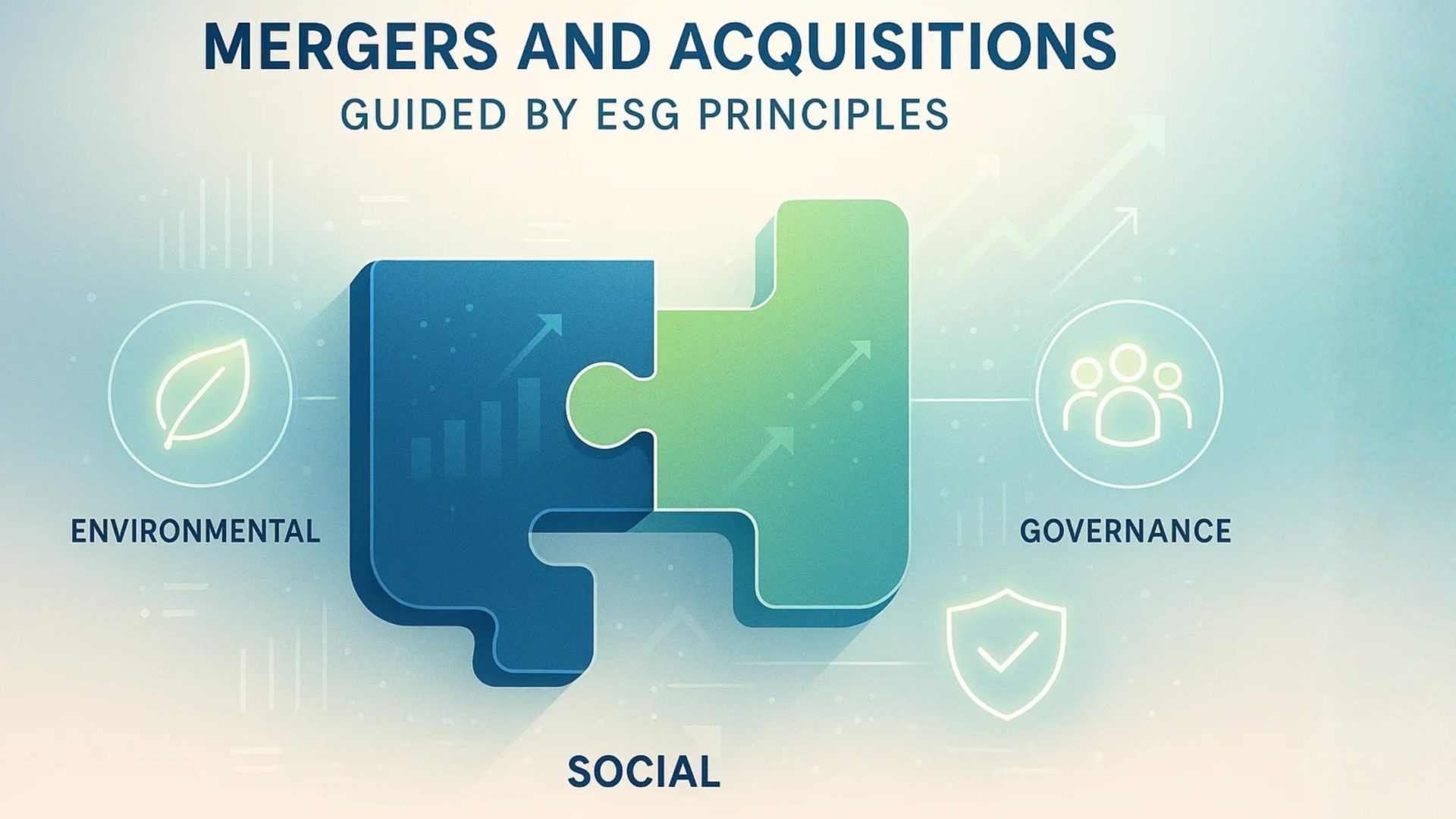The ESG Factor: Building Long-Term Value in Mergers & Acquisitions
Published on 13/10/2025

1. Integrating ESG Principles into Modern M&A Strategies
ESG factors pertain to non-financial performance indicators, encompassing Environmental, Social, and Governance aspects. These include how a company manages resource utilization, waste emissions, labor practices, and adherence to regulatory requirements. In the context of M&A, ESG considerations can significantly impact valuation, deal structuring, and long-term performance.
In recent years, companies have increasingly focused on integrating ESG into their business strategies to drive sustainable growth and create long-term value. Incorporating ESG enables risk mitigation, strengthens reputation and brand value, and ensures alignment with regulatory and investor expectations.
2. Understanding ESG in the Context of Mergers & Acquisitions
ESG stands for Environmental, Social, and Governance framework, which helps to evaluate a company’s non-financial performance and its impact on sustainable value creation.
The various components of ESG are
|
|---|
3. The Role of ESG in Due Diligence
ESG due diligence has become a strategic necessity in M&A, as investors now recognize that environmental, social, and governance factors significantly influence a company’s valuation, risk, and long-term sustainability. ESG assessment enables more informed, responsible, and sustainable acquisition decisions, balancing short-term returns with long-term value creation and risk management.
Some of the non-financial risks assessed through ESG are:
- Environmental Risks: pollution liabilities, non-compliance with environmental laws, or unsustainable resource use.
- Social risks: labor issues, poor employee welfare, health and safety violations, or community conflicts.
- Governance risks: weak internal controls, corruption, unethical practices, or board inefficiencies.
These factors can lead to legal penalties, reputational harm, and financial losses if not managed properly. Thus, ESG risk management has now become an essential part of the Due Diligence Process.
During M&A, acquirers typically use a combination of ESG frameworks to ensure a thorough assessment—for example, GRI and SASB for disclosure and reporting standards, TCFD and UN PRI for climate and investment risk management, and OECD Guidelines or IFC Performance Standards for evaluating social and governance practices. Together, these frameworks help conduct a comprehensive ESG due diligence process covering environmental, social, and ethical dimensions.
4. ESG as a Value Creation Driver
Environmental, Social, and Governance (ESG) initiatives are increasingly recognized as key drivers of value creation, helping companies enhance financial performance while ensuring sustainable long-term growth. Integrating ESG principles not only strengthens business resilience but also generates measurable benefits across multiple dimensions.
Key Benefits of Adopting an ESG Framework:
1. Enhanced Brand Reputation → Increased Sales & Pricing Power
Companies with strong ESG credentials enjoy higher consumer trust and loyalty. Sustainability-focused practices can boost willingness-to-pay among ESG-conscious customers, reduce churn, and support long-term top-line growth.
2. Improved Operational Efficiency → Cost Savings
Implementing energy optimization, resource efficiency, and circular-economy initiatives can significantly lower utility and material costs. These efficiency gains often pay back within a few years, improving margins and delivering greater shareholder value.
3. Risk Mitigation → Preserved Enterprise Value
Proactive ESG management helps prevent major incidents, such as environmental accidents, labor disputes, or governance scandals. Avoiding such events protects the company from one-time financial losses, reputational damage, and long-term share-price volatility. Studies consistently show a positive or neutral correlation between strong ESG performance and financial outcomes.
4. Access to Sustainable Finance → Lower Capital Costs
Companies with credible ESG reporting can tap into green or sustainability-linked financing, attract ESG-focused investors, and potentially reduce borrowing costs. Global issuance of labeled bonds reached approximately $1.1 trillion in 2024, highlighting growing investor appetite for sustainable investments.
By embedding ESG into core strategies, businesses can unlock both financial and non-financial value, positioning themselves as leaders in a competitive, sustainability-driven market.
5. ESG Integration Strategies in M&A
Here is a clear overview of ESG integration strategies in M&A:
1) Pre-Deal ESG Assessment
- ESG Due Diligence: Evaluate the target company’s environmental, social, and governance practices, risks, and opportunities.
- Materiality Analysis: Identify ESG factors most relevant to the sector, region, and business model.
- Regulatory & Compliance Check: Ensure the target complies with local and international ESG regulations.
2) Deal Structuring & Valuation
- ESG-Linked Pricing: Adjust valuation based on ESG framework (e.g., environmental remediation, labor issues).
- Warranties & Indemnities: Include ESG-related clauses to protect against hidden ESG risks post-acquisition.
- Incentives for ESG Performance: Structure earn-outs or bonuses tied to ESG metrics.
3) Post-Merger ESG Integration and Monitoring
- Policy & Governance Alignment: Harmonize ESG policies, codes of conduct, and reporting frameworks across the merged entity.
- Operational Integration: Implement sustainable practices in energy, waste, supply chain, and workforce management.
- Cultural Integration: Promote a shared ESG culture, employee training, and stakeholder engagement.
- KPIs & Metrics: Track ESG performance post-merger using frameworks like GRI, SASB, or TCFD to ensure post-merger sustainability.
6. ESG in Different Sectors: Sector-Specific Considerations
Environmental, Social, and Governance (ESG) factors vary across industries, with each sector prioritizing specific risks, performance indicators, and reporting standards. Understanding these sector-specific considerations is crucial for companies to implement effective ESG strategies and ensure compliance.
1. Manufacturing Sector
In manufacturing, ESG focuses on environmental impact, operational efficiency, and worker safety. Key performance metrics include:
-
Carbon intensity: CO₂ emissions per unit produced
-
Energy consumption
-
Lost-time injury rate
Reporting in this sector typically follows GRI, SASB (industry-specific), and ISO 14001 standards.
2. Finance Sector
For financial institutions, ESG risks are primarily linked to lending, investments, and portfolio exposure. Important metrics include:
-
Proportion of sustainable assets
-
Exposure to high-carbon industries
-
Financial inclusion indices
Reporting aligns with UN PRI, SASB financial sector standards, and TCFD for climate-related financial disclosures.
3. Energy Sector
In the energy sector, environmental considerations dominate, while social factors like workforce safety and community engagement are also critical. Key metrics include:
-
Greenhouse gas emissions
-
Water usage
-
Share of renewable energy
Companies report using TCFD, SASB energy sector standards, and IFC Performance Standards.
4. Technology Sector
For technology companies, ESG emphasizes energy-efficient operations, e-waste management, data security, and workplace diversity. Key indicators include:
-
Data center energy consumption
-
E-waste recycling rates
-
Cybersecurity incidents
-
Gender and ethnic diversity ratios
Reporting standards include GRI, SASB tech sector standards, and ISO 26000 for social responsibility.
By tailoring ESG strategies to sector-specific risks and metrics, organizations can enhance sustainability performance, meet regulatory requirements, and improve stakeholder trust.
7. Challenges of Implementing ESG in M&A
Integrating Environmental, Social, and Governance (ESG) principles into mergers and acquisitions (M&A) is a complex process that comes with several challenges. Companies often face obstacles such as inconsistent ESG standards, limited availability of reliable data, lack of market practices and technical expertise, stakeholder alignment issues, and varying global regulatory requirements—particularly in emerging markets. Additionally, differences in corporate culture and ESG maturity between merging entities can complicate integration efforts.
Key Strategies to Overcome ESG Challenges in M&A:
1. Strengthen ESG Due Diligence
Start ESG evaluations early in the M&A process and go beyond standard compliance checklists. A thorough assessment helps identify hidden risks and opportunities, ensuring informed decision-making.
2. Create Interdisciplinary Working Groups
Form teams that include legal, technical, and financial experts, and external advisors. These groups can draft adaptable ESG guidelines, continuously update them, and ensure a comprehensive approach to risk management.
3. Set Measurable ESG Targets
Define clear, actionable goals—such as carbon reduction, responsible sourcing, or workplace diversity—and establish KPIs and implementation roadmaps to track post-merger progress.
4. Engage Stakeholders Early
Identify key stakeholder groups, including employees, customers, investors, and local communities. Engage them through town halls, workshops, and transparent communication of ESG objectives and integration plans.
5. Incorporate Stakeholder Feedback
Implement feedback mechanisms to involve stakeholders in identifying ESG risks and opportunities. Address concerns proactively during due diligence and planning to ensure alignment and foster trust.
By addressing these challenges proactively, organizations can integrate ESG successfully into the M&A process, mitigate risks, and create sustainable long-term value.
8. Future of ESG in Mergers & Acquisitions
ESG has become a decisive factor in M&A, with growing regulatory demands and mandatory disclosures pushing companies to integrate ESG into deal processes worldwide. Investor pressure and tightening global standards mean companies with strong ESG credentials are seen as safer and more valuable acquisition targets, making ESG performance disclosure crucial for successful transactions and sustainable investment strategies in 2025.
ESG regulations is now a critical differentiator in competitive M&A strategies, with companies demonstrating strong ESG credentials frequently commanding premium valuations and attracting more investor interest. Institutional investors and acquirers increasingly factor ESG into due diligence, deal pricing, and post-merger integration, using it to assess risk, regulatory compliance, and long-term value creation. Targets with poor ESG integration face higher transaction risks, reputational concerns, and may even lose deal prospects, while those with robust sustainability practices, governance, and social impact gain a distinct strategic edge in a competitive market.
9. Conclusion
Environmental, Social, and Governance (ESG) considerations have transformed the landscape of mergers and acquisitions. Companies that actively integrate ESG into their M&A strategies not only mitigate financial, operational, and reputational risks but also unlock significant long-term value. From enhancing brand reputation and operational efficiency to accessing sustainable financing and attracting investor confidence, ESG is now a critical driver of sustainable growth and competitive advantage.
In today’s dynamic business environment, organizations that prioritize ESG stand out as forward-thinking, resilient, and responsible—qualities that increasingly influence deal valuations, investor decisions, and stakeholder trust. Failing to embed ESG practices can lead to missed opportunities, higher transaction risks, and reputational setbacks, making ESG integration no longer optional but essential for successful M&A outcomes.
Step Into ESG-Driven Success
Maximize value and drive sustainable growth in your M&A activities by integrating ESG principles today. At Inspirigence Advisors, we bring extensive expertise in Fund Accounting and Fund Administration, Regulatory Compliance, Accounting Services, CFO/COO Functions, and Investor Relationship & Advisory for a wide range of clients, including Private Equity, Hedge Funds, corporates, and other business entities.
Partner with Inspirigence Advisors to implement robust ESG frameworks, align your corporate strategy with globally recognized standards, and unlock long-term value. Take the first step toward building a resilient, responsible, and future-ready organization that stands out in today’s competitive market.

